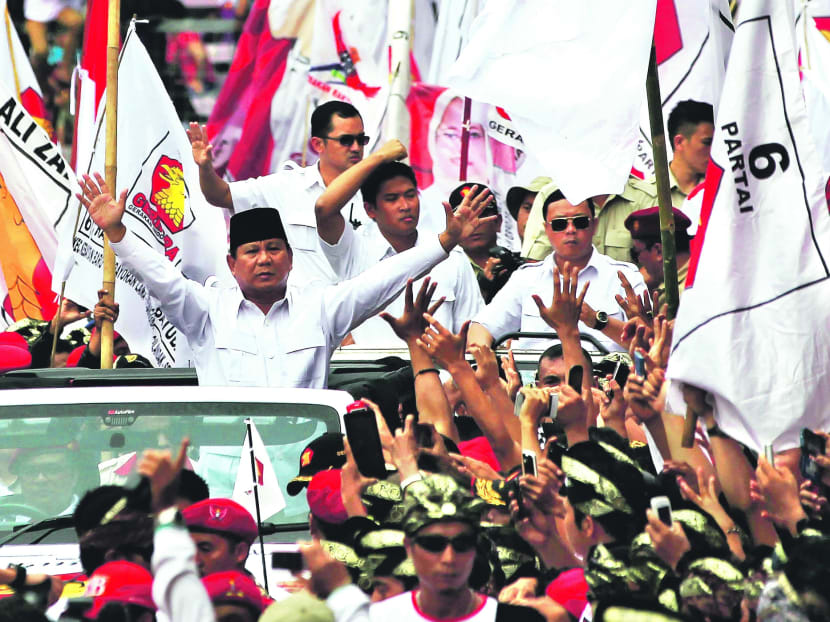Former Indonesian general secures support from oldest Islamic party
JAKARTA — Presidential hopeful Prabowo Subianto has received a small boost in his bid for the country’s top job, with his Gerindra party yesterday receiving the backing of Indonesia’s oldest Islamic party. But the alliance may not help him much as the United Development Party (PPP) has been plagued by internal conflict and it is likely that disgruntled PPP officials and supporters might back other presidential candidates instead.

The partnership may not help Mr Prabowo Subianto much as the United Development Party (PPP) has been plagued by internal conflict and it is likely that disgruntled PPP officials and supporters might back other presidential candidates instead. Photo: Reuters
JAKARTA — Presidential hopeful Prabowo Subianto has received a small boost in his bid for the country’s top job, with his Gerindra party yesterday receiving the backing of Indonesia’s oldest Islamic party. But the alliance may not help him much as the United Development Party (PPP) has been plagued by internal conflict and it is likely that disgruntled PPP officials and supporters might back other presidential candidates instead.
PPP won 6.7 per cent of the vote in last Wednesday’s parliamentary election, while Gerindra was expected to win 11.8 per cent based on early vote counts. Official results will be announced early next month.
Parties need to win at least 25 per cent of the vote or 20 per cent of seats in the 560-seat Parliament to nominate presidential or vice-presidential candidates.
This means Gerindra would have to get at least another political party on board to qualify for the presidential race. Mr Prabowo, a former general who has struggled to shake off accusations of human rights abuses, is currently running a distant second in opinion polls for the July 9 presidential election behind hugely popular Jakarta Governor Joko Widodo.
Mr Widodo’s Indonesian Democratic Party-Struggle (PDI-P) emerged the front-runner in the parliamentary election, securing about 19 per cent of the vote, followed by Golkar with about 14 per cent and then Gerindra.
Mr Prabowo said he hopes that a partnership with the PPP will lead more parties to rally behind him.
“It is possible that our coalition will continue to grow,” he said at a news conference at the PPP headquarters, the Jakarta Globe reported.
“The PPP sees Mr Prabowo as the right person to lead Indonesia for the better,” Mr Suryadharma Ali, PPP chairman and the Religious Affairs Minister in the outgoing government, told reporters.
The announcement of the coalition comes a day after Mr Suryadharma dismissed six party officials, including a deputy, for attempting to oust him.
Deputy chairman Suharso Monoarfa and other officials had asked the party’s board to sack Mr Suryadharma over his appearance at a Gerindra rally in Jakarta last month, a move they said has cost the PPP votes in the April 9 legislative election.
But the move backfired and they were sacked by Mr Suryadharma.
“PPP was peaceful, but all of a sudden, there was turmoil. It is my duty as Chairman to restore order (to the PPP),” he reportedly said on Thursday. “If anyone disagrees with the chairman, they can step down.”
PPP’s win of 6.7 per cent of the vote was marginally higher than the 5.32 per cent it secured in 2009. Some party officials say PPP would have fared better this year if it had allied itself with PDI-P and Mr Widodo.
Given the split in PPP over support for Gerindra and PDI-P, Mr Prabowo may not get all the votes from PPP supporters, said political scientist Ari Dwipayana from Gadjah Mada University in Yogyakarta.
The PPP-Gerindra coalition is also likely to end further talk of an alliance among the five Islamic parties, which altogether won a better-than-expected 31 per cent of the vote.
Said analyst Siti Zuhro from the Indonesian Institute of Sciences: “The so-called Islamic party alliance is a strategy to increase the parties’ bargaining power as no party has reached the 25 per cent threshold.
“But it is difficult because they don’t have a single figure who is strong enough to be nominated (as a presidential candidate).”
So far, only PDI-P is able to nominate presidential or vice-presidential candidates, after it formed an alliance with NasDem, which won 6.9 per cent of the vote.
Golkar had earlier secured the support of Hanura Party, which won 5.4 per cent of the vote. Like Gerindra, Golkar has fallen short of the 25 per cent threshold. Both parties have been wooing other parties in hope of reaching the threshold.
The National Awakening Party (PKB), particularly, has been much sought after as it won 9.2 per cent of the vote, the highest among the Islamic parties.
Mr Dwipayana and Ms Zuhro said that PKB would likely form a coalition with PDI-P and NasDem. If so, the three parties will command an almost 35 per cent of the popular vote.
Pundits argue that Mr Widodo would need 35 to 40 per cent of the vote to better dictate terms in Indonesian politics. He has also warned against an unwieldy coalition of many parties.






